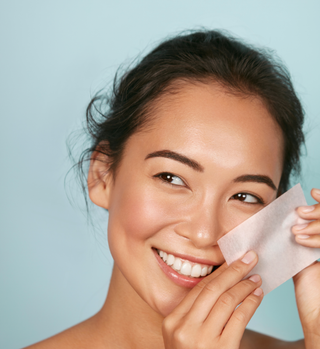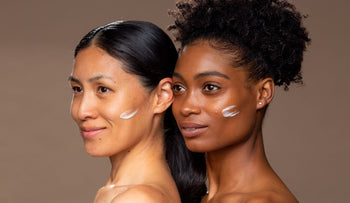You’re human. That means your skin secretes oil through your oil glands. But, if you’re among the group of people whose oil glands are a bit too productive, the excess oil can frustrate you and cause additional skin concerns.
An oily skin type means the skin’s sebaceous glands produce too much sebum. Sebum, more commonly known as oil, helps keep your skin hydrated and healthy; but too much of it is rarely a good thing. The excess of sebum adds a greasy layer to your skin, leaving a visible shine and clogging pores. As pores become clogged, bacteria, pollutants and dead skin cells can be embedded, leading to acne breakouts.
Fortunately, oily skin is easily managed once you know what causes it in the first place.
What causes oily skin?
Genetics
Overactive sebaceous glands can often be chalked up to genetics. If your parents have oily skin, then there’s a high chance that you will too.
Hormones
Hormones bind to our sebaceous glands and cause them to produce more sebum. When you experience an increase in hormones, such as during puberty, pregnancy, or menopause, you may notice that your skin becomes oilier.
Weather
While cold weather is more likely to lead to dry skin, hot, humid climates are likely to stimulate oil secretion and lead to oilier skin. Heat has a naturally stimulating effect, causing your sebaceous glands to produce more oil.
Stress
When you’re stressed, the level of the body's stress hormone, cortisol, rises, leading to increased sebum production.
Issues with your skincare regimen
Be mindful of your skincare regimen by sticking to at least three basic steps: cleanse, treat, and moisturize. Of course, choosing products that are ideally suited for your skin type is essential.
While it may seem contradictory, cleansing or exfoliating your skin too often can lead to increased oil production. Over-cleansing can easily strip your skin of vital oils, leaving it to overcompensate by producing more oil. Over-cleansing puts your skin’s sebaceous glands into overdrive to make up for the loss.
Additionally, you may think that oily skin doesn’t need to be moisturized—but that’s actually a common skincare myth. Healthy skin needs moisture and skipping a moisturizer could actually make your skin oilier than it should be. The solution is to find a moisturizer suitable for your skin and that meets its needs day after day.
Diet
From dairy products and salty foods to alcohol and sugar, your diet can have a noticeable effect on how oily your skin is throughout the day. Dairy products cause oily skin because they’re high in hormones, while sugary foods can cause inflammation, leading to increased oil production. Both salty foods and alcohol also have the effect of dehydrating your skin, leading to an overproduction of oil by the sebaceous glands.
How to prevent oily skin
While you can’t do much about genetics, hormones or the climate you live in, there are some causes of oily skin that can be easily managed:
Manage stress
If you often find yourself feeling stressed and anxious, then you may want to address the cause to find out where the problem lies. If your stress is caused by an unavoidable situation such as work or family life, there are options like meditation and self-help books which can assist you in managing your stress levels better.
Use skincare products that are right for you
If your skin is oily, your twice-daily skincare regimen should comprise non-comedogenic and perhaps oil-free products, depending on your level of oiliness.
To start, cleanse your skin with a hydrating cleanser such as our MULTI CORREXION® Revive + Glow Gel Cleanser to remove any impurities before applying a serum and an eye cream to target your personal eye concerns.
Follow with a matte moisturizer that seals your skin’s essential moisture without clogging your pores. Be sure to always properly remove your makeup before bed so your pores don’t become clogged with hardened sebum, dirt, and dead skin cells while you sleep.
It helps, too, to swap out your face towel frequently and clean your makeup brushes with gentle cleansers like micellar water.

Eat a healthy diet
Foods rich in omega-3 fatty acids, such as fish, spinach, and walnuts, have been found to reduce pimples caused by oily skin. Stay away from fried or greasy foods, and try to limit your dairy intake, too.
To discover more skincare tips and advice, head to our blog or find out how to get rid of dark spots on your face.







